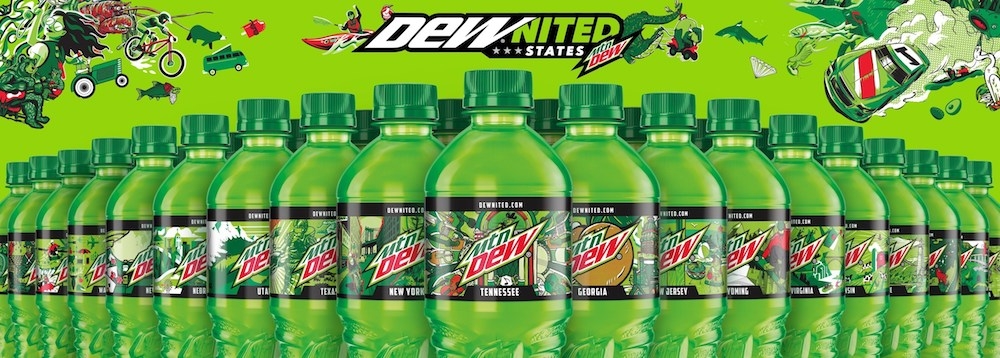
In June, Mountain Dew released the Dewnited States Collection, a limited-edition bottle series representing all 50 American states, inspired by home-state pride. The effort follows the trend of beverage companies looking to build brand loyalty through personalized, region-specific connections, rather than widespread national and international campaigns. Each collectible bottle features artwork unique to the state it represents.
“The animated, playful designs include one for California that includes images of surfboards and redwood trees. New York’s shows the Brooklyn Bridge and the Illinois bottle includes an illustration of Chicago’s public art sculpture known as the Bean,” AdAge reports in its article, Mtn Dew made 50 bottle designs, one for each state.
The ambitious campaign was supported by more than 450 unique creative assets, including 50 separate 15-second videos, in-store displays, social media ads, augmented/virtual reality experiences and more, customized for each state, as well as a national television ad from parent company PepsiCo. Mountain Dew also offered consumers a US$100 prepaid gift card to those who collected all 50 limited-edition bottles.
Agencies on the campaign include BBDO New York, which handled the TV and digital creative; and Motive, which oversaw label design and static creative, AdAge reports.
However as the beverage brand rolled out the campaign, consumers soon spotted a geography error in the creative assets — Michigan’s Upper Peninsula was incorrectly coloured in the same green and white pattern as the state of Wisconsin in a map of the United States. Unfortunately, the illustration had already begun appearing in the national commercial spot and in the introduction of each state-specific ad. About a month into the campaign, the error was called out publicly by the Upper Peninsula’s official Twitter handle, urging Mountain Dew to “fix this.” The Upper Peninsula tweeted, “@MountainDew do you want to gain a bunch of fans? I triple dog dare you to come out with an Upper Peninsula edition for your #DEWnited [campaign].”
“We saw that and immediately thought, ‘We have to fix this.’ We dishonoured the people of this place,” Nicole Portwood, VP Marketing for Mountain Dew, said in an interview with Adweek.
Mountain Dew responded swiftly and tweeted back, asking Yoopers (residents of the Upper Peninsula) to send in design ideas for a limited-edition bottle: “Hey, Upper Peninsula: we hear you, and we’re sorry for misplacing you on our #DEWnited map. Give us a chance to right our wrong. Help us fill this special-edition label by telling us all of the things you love about the Upper Peninsula (note to self: located in MICHIGAN).”
The brand was flooded with thousands of comments and suggestions about how the label should look, Portwood told Adweek, and soon there were several drafts for a bottle design.
“As luck would have it, the man who ran the Upper Peninsula handle, Bugsy Sailor, also has a background in graphic design and helped them arrive at a final iteration. Mountain Dew then worked with its bottlers in the region to print the labels and ultimately produce 906 bottles. Portwood estimates the whole process, from concept to finished product, took about a month,” writes Erik Oster in the Adweek article, How Mountain Dew turned a geography error into a source of love for the brand. Because the labels weren’t commercialized, Mountain Dew was able to expedite the creation and production of the specially-created bottles, and used them as giveaway prizes at the Upper Peninsula State Fair within weeks of the Twitter exchange.
“Behind brands are groups of people. We are fallible, we bring heart and energy to our work and if you have the right type of [moral] compass, I believe that shows to our fans,” continued Portwood, in her interview with Adweek. “It’s hard to put in an ROI model, but if you couple that kind of true north-guided behaviour with other table-stakes marketing fundamentals, I believe it has an amplification effect that shows its value well-beyond sales goals and things like that.”
In addition to delivering top-notch products and services, a business must create strong brand identity and positive customers experiences that resonate with audiences. In this case, Mountain Dew addressed the error promptly – turning “oops into opportunity,” as creative agency Motive puts it – and ultimately created an opportunity to build deeper bonds with existing consumers and expand its consumer base within the Upper Peninsula community.
This column was originally published in the October 2019 issue of PrintAction, now available online.
Print this page
